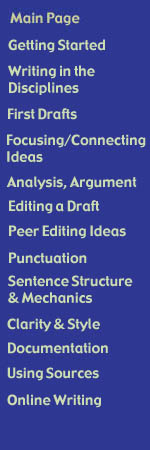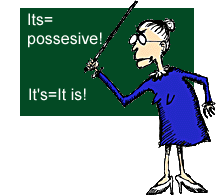

Grammar Problems in Writing Conferences
(printable version here)
Knowing how to address grammatical errors is one of the greatest challenges for a writing conference. Many writing teachers do not suggest beginning with grammatical issues, yet other professors have strong sanctions against even a single misplaced comma. Julie Kimmel and Erika Schmierer, apprentice Writing Consultants in the Fall of 2000, prepared these guidelines for helping peers with grammatical issues. Julie gives "quick tips" for a writing conference, while Erika's advice gives reasons for common problems that occur.
Julie's Tips:
- Save sentence level errors for the end of conference. Remember to work on global issues of content and overall paper structure before delving into grammatical errors.
- Address clear, recurring grammatical problems first. Bartholomae divides errors into three categories, one of which is typos or slips of the pen. Such errors are minor and need not take up time in conference. Instead deal with errors resulting from confusion of grammar rules and those resulting from dialect interference.
- Keep in mind the conventions of academic discourse. As said before, every subject has its own grammatical nuances. Be aware of both general academic conventions as well as those of particular discourse at hand.
- Promote grammar as a source of power. Grammar is a tool each writer can use to effectively express their ideas and persuade their reader. It is closely wedded to style and content as slips in grammar can distract a reader from the essence of the paper.
- Teach grammar in the context of a writer's own writing. Writers will learn best if they apply grammar rules to sentences they have generated on their own. This gives them a familiar and comfortable context in which to work.
- Stick to concepts you understand clearly. If you receive a draft before conference, look up concepts you want to discuss to make sure you have a firm understanding. If you are unsure about a grammatical concept and have no time to look it up on your own before conference, point the writer in the direction of someone who can help (as opposed to in the direction of a grammar handbook, which will likely confuse).
- Explain concepts thoroughly. Introducing foreign grammatical vocabulary without adequate explanation will only confuse a writer.
- Read the paper aloud. This technique is invaluable, as it lets the writer hear and correct mistakes on his/her own.
Erika's "Grammar Pitfalls"
Pitfall #1: Making grammar instruction the main focus of the consultation.
 This is an easy trap to fall into, as blatant grammatical mistakes are both hard to ignore and often easy to correct on the surface level. No matter what extent of "grammar damage" a paper contains, every Consultant must remember to stay focused on the main goal of the appointment - to improve the writing process. As Gleason advocates in Linguistics and English Grammar, "We must teach not only a body of facts and theories, but also a technique - a technique by which the body of facts and theories can be augmented as needed" (490).
This is an easy trap to fall into, as blatant grammatical mistakes are both hard to ignore and often easy to correct on the surface level. No matter what extent of "grammar damage" a paper contains, every Consultant must remember to stay focused on the main goal of the appointment - to improve the writing process. As Gleason advocates in Linguistics and English Grammar, "We must teach not only a body of facts and theories, but also a technique - a technique by which the body of facts and theories can be augmented as needed" (490).
There is a place for grammar instruction in the appointment, but only after other larger and more pressing issues have been addressed. The Consultant mustn't accidentally slip into formalized, prescriptivist grammar instruction, as such instruction is both ineffective and often- times destructive. Instead, Consultants should use their unique positions as peers to facilitate specified grammar instruction at the end of an appointment as a supplement to writing techniques and applications already learned.
Pitfall #2: Talking "at" the writer - failure to collaborate effectively.
Failure to effectively collaborate is a potential problem in any appointment, but especially those involving grammar instruction, as there can be a power struggle going on between writer and Consultant. If the Consultant talks at the writer rather than with the writer about grammar usage, the Consultant could potentially and wrongfully be seen as a hard-nosed grammar teacher.
One reason why formal, prescriptivist grammar instruction often fails is the gap between teacher and writer. Little connection exits for collaboration, as the teacher technically holds the grade over the writer, thereby making him/her less eager and willing to learn. Fortunately, in the writing consultation this relationship does not exist. Instead, both writer and Consultant are on the same level as peers and as students. In this case, the writer sees the Consultant as someone with a slightly more advanced, yet unintimidating, understanding of grammar and thus as an ally. The writer will be more desirous to emulate the Consultant in this situation, as he/she sees attaining the Consultant's level of grammatical understanding as a realistic possibility. Thus, effective collaboration is imperative in consultations both as a way of engaging the writing and motivating him/her to take risks without fear of penalty (Harris 30).
Pitfall #3: Emphasizing editing rather than understanding.
The final pitfall involves the overemphasis of "editing" rather than increased understanding in solving grammatical problems. This approach is frequently found in the classroom, as teachers have little time to work individually with students and instead dispense "practical" editing methods for improving sentence-level errors in papers. While this approach has a certain appeal and can obviously help with the aesthetics of a paper, it will not result in real improvement in either grammar usage or writing development.
The main focus of the writing consultation is the overall writing process and the Consultant thus wants to teach the writer how to use grammar in this overall process. In order to do this effectively, the Consultant must concentrate on small amounts of content so as not to overwhelm the writer. Furthermore, the Consultant must aim for a deeper understanding of the balance between styles and writing dimensions so that the writer gains the ability to both recognize and resolve conflicts in his/her papers (Gleason 477).
By focusing on "editing" in a consultation, a Consultant only scratches the surface of improving grammar usage. True improvement will only come with increased understanding through repeated collaboration on individual grammatical problems in the context of the student's paper. Leave strict paper "editing" up to the writer. Not only is it for the most part disallowed in the writing consultation, but it's the writer's job - not yours.
Works Cited
Bartholomae, D. "The Study of Error." College Composition and Communication, 31.3 (Oct. 1980): 253-269.
Gleason, H. Linguistics and English Grammar. New York: Holt, Rinehart and Winston, 1965.
Harris, M. Tutoring Writing: A Sourcebook for Writing Labs. Glenview, Il: Scott, Foresman 1982.
Back to 'Peer Editing Ideas'
Writer's Web | Writing Center | Make
an Appointment | Library
Copyright Info